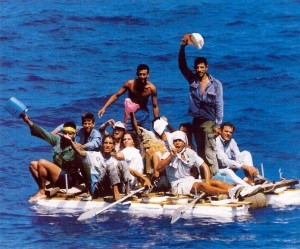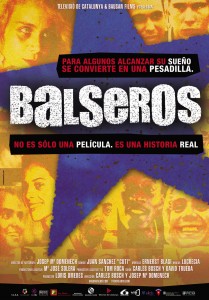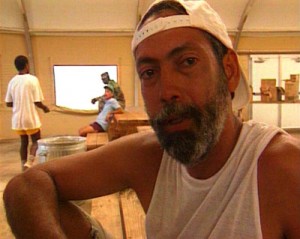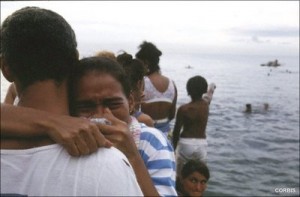Balseros; In Pursuit of the ‘American Dream’
February 27, 2012 by admin
Under Cuban criminal law it is illegal for Cubans to leave their country or to assist others to leave without government permission and violators are subject to a prison term of one to ten years (Sweig, 2009). However, in defiance of the law, more than 63,000 Cuban citizens have left between 1959 and 1994 thus they have become collectively known as Balseros [Rafters]. It is estimated that at least 16,000 rafters did not survive the crossing.
However, between 1994 and 1995, over 40,000 impoverished Cubans made a desperate attempt to navigate the 90-mile dangerous waters between the their island and the Florida coast prompting President Castro to announce that the Cuban Frontier Guard (the Cuban Coast Guard) would not enforce laws against leaving. The 2002 documentary Balseros by filmmaker Carlos Bosch followed the stories of seven Cuban exiles from their exodus from Cuba to their nine-month stay at Guantanamo Bay and eventual immigration into the U.S. to see where their dreams of freedom took them. These refugees repeatedly and interchangeably used the term “Freedom” and the “American Dream”. Out of curiosity and as an immigrant myself, this prompted me to explore what this ‘dream’ meant to the Balseros refugees in the film.
What really is the ‘American Dream?’ I ask this question that until fairly recently, I assumed had an obvious answer. I always believed that we all knew what that dream was because we hear about it so much, sacrifice so much for it, die for it or in the case of the Balseros immigrants, risk lives under inhumane conditions to realize it. Well, again I ask, what is this dream? Rafael Cano from the film, Balseros said all he wanted was to own a house and a car because that’s what was worth risking his life for while Juan Carlos wanted to reunite with his wife and daughter who had to flee Cuba in pursuit of a better life. Did the “American Dream” therefore represent the house and car? Reunion with family? Jobs? Freedom?
Well I guess the most obvious question I felt had to be directed to myself; why did I move to America and what was this dream to me? Honestly, I never even critically thought about the answer to this question; I always felt that it was a ‘no-brainer’ because it was an assumption of a common pursuit but to my dismay, I still cannot answer what this dream is because I feel that it doesn’t exist for me. I have been able to have tremendous opportunities as a result of being in America that I would have otherwise no had access to in Kenya but if had to choose I would avail the same opportunities at home, close to my family and loved ones and have the option [unlike most exiles and refugees] to visit and be visited in the event that I decided to immigrate. But, that is no the reality!
More importantly I was amazed at the drive and excitement that overshadowed the impact of moving to a foreign place away from loved ones and a familiar environment. Well, after being here for a little over five year, I realize how hard this transition was and cannot imagine what went on for the Barselos immigrants.
The scene where Oscar Del Valle talks on the phone with his then wife [he eventually cuts off communication with her and his daughter] about supporting them stuck with me very much and in turn, gave me an appetite for inquiring into the immense shift of priorities and ideology that they [the cast] has to undergo.
Obviously Oscar wanted to provide for his wife and daughter but his believes completely changed as he got his orientation about the necessity for him to develop individuality taking precedence over supporting his family because this was the only way to ‘make it in America’ as his mentor told him. Clearly as an immigrant who is accustomed to different ideologies and social norms, pursing this dream requires a re-orientation of personal and social values. Now I understand that this necessity might seem oblivious especially because these immigrants are moving to a different country with different societal values and lifestyle, how would they expect to maintain their values? I always held a similar general understanding but after personal experiences as an immigrant, I have since changed my mind.
Initially it seemed to me that the pursuit of this dream was well worth the erosion/neglect/reprioritization of my previously held values but after the excitement ended and reality set in, I realized how great of a sacrifice this involves and was saddened by the simplistic attitude commonly held about immigration. Think about it, these people had to risk their lives, leave their families and start life in unknown places. The psychological impacts of the pursuit are often neglected if not dismissed in the overwhelming excitement of a wonderful life. Am not saying that America is not a wonderful place; my point is that these immigrants had to develop a sub-human attitude in order to attain this dream that as it turns out, cannot be explicitly defined.
It was hurt breaking to watch the Balseros immigrants leave their families and five years later find themselves in difficult circumstances; apart from Juan who was happily working as Employee of the Month at Staples and reunited with his family [notice that his daughter who spoke Spanish could not speak it fluently anymore], the others had undergone difficult transformation from break-ups, drugs [hustling] and so on. So did they finally realize the dream they sacrificed so much to pursue? Well am sure the answer to this lies with them but I could not help but empathize with the difficulty involved in choosing to immigrate under such circumstances and what state of mind one has to be in order to have the courage to do as the Balseros immigrants did.
Sources
State of Florida, HRS:OSRA. 1994. 1994: The Status of Florida’s Refugee/Entrant Population, Entrants: Florida’s Unique Population.
United States Coast Guard. Alien migrant interdiction statistics. http://www.uscg.mil/hq/g-o/g-opl/amio/AMIO.htm
United States. Congress. House. Committee on International Relations. Subcommittee on the Western Hemisphere. 1996. The Clinton administration’s reversal of U.S. immigration policy toward Cuba: hearing before the Subcommittee on the Western Hemisphere of the Committee on International Relations, House of Representatives, One Hundred Fourth Congress, first session, May 18, 1995. Washington: U.S. G.P.O.
http://www.bausanfilms.com/fitxaEquipo.php?idioma=EN&produccio=50&tipo=documentales&titulo=BALSEROS
http://www.unhcr.org/home/RSDCOI/44eb2fd44.pdf
Leave a Reply
You must be logged in to post a comment.




